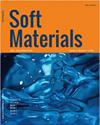Self-assembly of multiple stimulus response copolymer by ATRP in different media
IF 1.4
4区 材料科学
Q4 MATERIALS SCIENCE, MULTIDISCIPLINARY
引用次数: 2
Abstract
ABSTRACT The novel pH and thermo-sensitive amphiphilic triblock copolymer poly(methyl methacrylate)-block-poly(N-isopropylacrylamide)-block-poly[N,N-(dimethylamino) ethyl methacrylate] (PMMA-b-PNIPAM-b-PDMAEMA) was synthesized by ATRP. We have prepared the AB amphiphilic copolymer (PMMA-b-PNIPAM) and ABC amphiphilic triblock copolymer (PMMA-b-PNIPAM-b-PDMAEMA) of expected molecular mass. It was characterized by GPC,1HNMR and FT-IR spectroscopy. The AB amphiphilic copolymer ability of temperature response and the morphology of self-assembly micelles different in toluene, THF, and DMF. ABC amphiphilic triblock copolymer self-assembled petal structure in alkaline aqueous solution, and lamellar structure in acidic aqueous solution. Moreover, the transmittance of micellar solution changes with the increase of temperature; these changes reflect the pH and thermo-sensitivity of the block copolymer. The micelles behavior and morphology of the system were studied by transmission electron microscopy (TEM) and dynamic light scattering (DLS).多刺激响应共聚物在不同介质中的自组装
摘要采用ATRP法合成了新型pH和热敏两亲性三嵌段共聚物聚(甲基丙烯酸甲酯)-嵌段聚(N-异丙基丙烯酰胺)-嵌段聚[N,N-(二甲氨基)甲基丙烯酸乙酯](PMMA-b-PNIPAM-b-PDMAEMA)。我们制备了预期分子质量的AB两亲共聚物(PMMA-b-PNIPAM)和ABC两亲三嵌段共聚物(PMMA-b-PNIPAM-b- pdmaema)。用GPC、1HNMR和FT-IR对其进行了表征。AB两亲共聚物在甲苯、四氢呋喃和DMF中的温度响应能力和自组装胶束形态不同。ABC两亲性三嵌段共聚物在碱性水溶液中自组装花瓣结构,在酸性水溶液中自组装片层结构。胶束溶液的透过率随温度的升高而变化;这些变化反映了嵌段共聚物的pH值和热敏性。利用透射电子显微镜(TEM)和动态光散射(DLS)研究了体系的胶束行为和形貌。
本文章由计算机程序翻译,如有差异,请以英文原文为准。
求助全文
约1分钟内获得全文
求助全文
来源期刊

Soft Materials
工程技术-材料科学:综合
CiteScore
2.90
自引率
0.00%
发文量
21
审稿时长
2.2 months
期刊介绍:
Providing a common forum for all soft matter scientists, Soft Materials covers theory, simulation, and experimental research in this rapidly expanding and interdisciplinary field. As soft materials are often at the heart of modern technologies, soft matter science has implications and applications in many areas ranging from biology to engineering.
Unlike many journals which focus primarily on individual classes of materials or particular applications, Soft Materials draw on all physical, chemical, materials science, and biological aspects of soft matter. Featured topics include polymers, biomacromolecules, colloids, membranes, Langmuir-Blodgett films, liquid crystals, granular matter, soft interfaces, complex fluids, surfactants, gels, nanomaterials, self-organization, supramolecular science, molecular recognition, soft glasses, amphiphiles, foams, and active matter.
Truly international in scope, Soft Materials contains original research, invited reviews, in-depth technical tutorials, and book reviews.
 求助内容:
求助内容: 应助结果提醒方式:
应助结果提醒方式:


